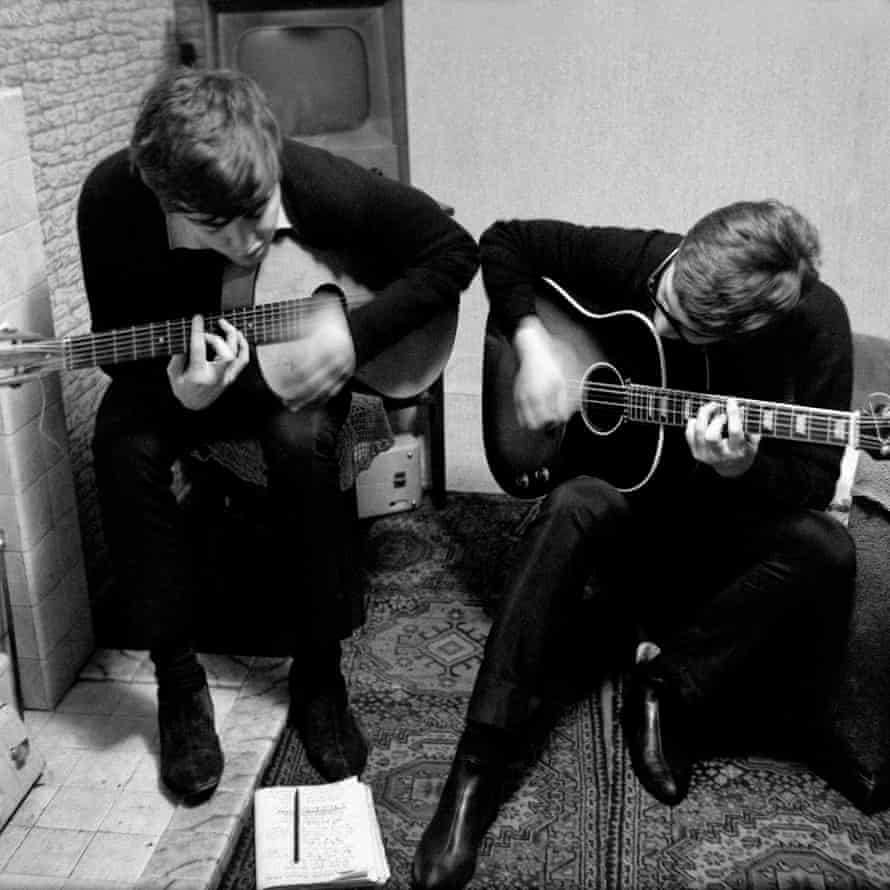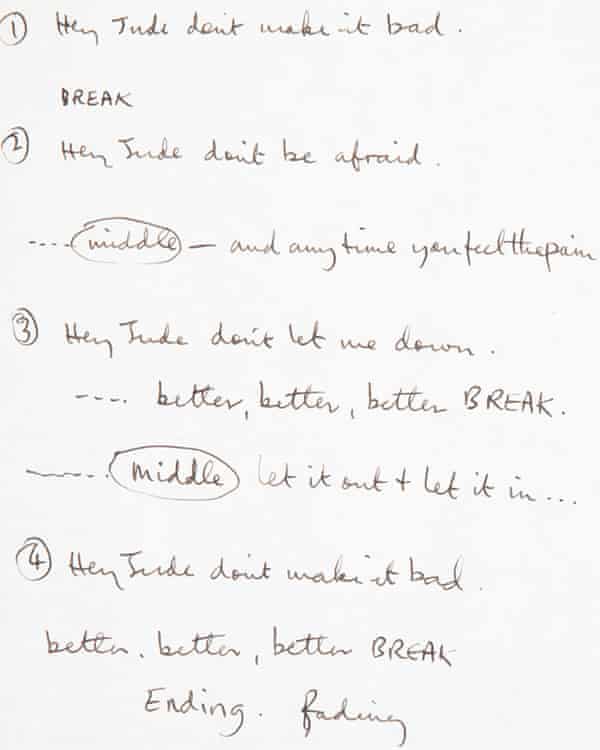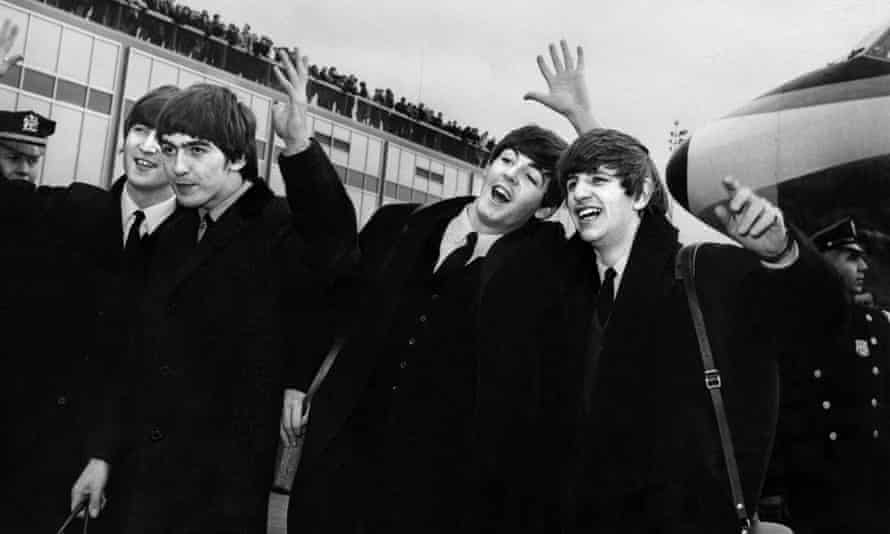Atmosphere Make It All Better Again Genius
T owards the terminate of 2022 I had a phone call from an unfamiliar number. The vocalisation, though, was immediately familiar. The newly elected Donald Trump introduced himself quite matter-of-factly. He lost no time in getting to the indicate: would I be willing to come to Washington to serve as his "Poetry Supremo"?
That Sir Paul McCartney turns out to exist such a brilliant mimic shouldn't have come as a surprise. Like almost all great writers, he'd apprenticed himself to the masters of the trade: Dickens, Shakespeare, Robert Louis Stevenson, Lewis Carroll. All apprenticeships are characterised past caricature and impersonation.
The context in which McCartney was exposed to both Rex Lear and Edward Lear is vital to an understanding of his achievement. Born in 1942, he was among the very first UK citizens to benefit directly from the 1944 Education Human activity, which immune many more possibilities for the historically underprivileged. Paul's parents had both come from immigrant families of Irish gaelic extraction and had at once an intrinsically complex human relationship to the United kingdom of great britain and northern ireland and a sense of belonging to Liverpool'due south vast Irish community. More significantly, though, they identified with the newly confident, insufficiently optimistic postwar generation.
As McCartney attests, his parents always wanted "greatness" for him and his blood brother Mike, and then the boys were encouraged to get to the best available schools. His father, a cotton fiber salesman, was "very good with words", and the fact that his female parent was a nurse ensured that Paul was "the just boy in school who could spell 'phlegm'".
The unmarried greatest influence on young McCartney turned out to be his English instructor, Alan Durband, who had attended Downing College, Cambridge, and been a pupil of FR Leavis, the doyen of close reading. McCartney's capacity for textual analysis, of his own piece of work as much equally others', may so exist traced directly to Durband'southward influence.
To have had such a secure grounding in the world of English literature accounts for only function of McCartney'southward success. That he is equally steeped in the popular song tradition – not only Picayune Richard and Chuck Berry, but the songwriters of the Brill Edifice and Tin Pan Alley – has given him a remarkably wide musical vocabulary. Among his earliest heroes were Fred Astaire, Hoagy Carmichael, George and Ira Gershwin and Cole Porter. Though he would later be in conversation with such avant garde composers as Karlheinz Stockhausen and John Cage, McCartney'southward immediate influences were the Everly Brothers and, preeminently, Buddy Holly. "Elvis wasn't a writer or a lead guitarist; he was just a singer. Duane Eddy was a guitar thespian but non a vocalist. Then Buddy had information technology all." Buddy Holly wrote his own songs, sang them and played guitar.
In his ain songwriting buddy, John Lennon, what McCartney recognised from the outset was John's equally prodigious ventriloquistic capacities. However groundbreaking their work would turn out to be, the Beatles were constantly in dialogue with their contemporaries, whether the artists associated with Motown, the Beach Boys, or Bob Dylan, or the singers and songwriters of a slightly earlier era. Even now, McCartney will psych himself into a song by channelling Fiddling Richard or Fred Astaire. He may even occasionally channel John Lennon. He acknowledges that the interplay of Lennon and McCartney was "nothing short of miraculous", describing how they "wrote with ii guitars". "The joy of that was that I was left-handed and he was right-handed, so I was looking in a mirror and he was looking in a mirror."
The other souvenir McCartney recognised in Lennon was his willingness not simply to improvise but to meliorate. Together, they were e'er "on the sentry for the kind of subject that hadn't really been the stuff of popular song". They shared the eternal schoolkid's engagement with nonsense and nursery rhyme, also as a Byronic lingering over the slightly outrageous rhyme, whether "Edison/medicine" or "Valerie/gallery". They were blessed to discover in George Martin a producer who could keep pace with them – sometimes, indeed, setting the pace. Martin's suggestions for cord arrangements and his openness to the inventiveness of Robert Moog and his newfangled synthesiser immune the Beatles to exist chronically inventive themselves.

A persistent component in the Beatles' soundscape that is ofttimes overlooked is the impact of radio. McCartney describes Sgt. Pepper as "a big radio programme". Similar the residual of the Beatles, he grew up on a diet of madcap radio comedy such as the Goon Show, which ran from 1951 until 1960 and starred Peter Sellers, Spike Milligan and Harry Secombe. Other radio stars included the Liverpudlian zany Ken Dodd, ofttimes considered the last great music hall comedian. The influence of radio underscored McCartney's fascination with "what's missing in a piece", also equally the power of a few well-chosen words to ready a scene. The impact of radio drama, including Dylan Thomas'south 1954 masterpiece Under Milk Wood, cannot be overstated. So there'southward the role of stage drama, whether Sean O'Casey'due south Juno and the Paycock or Eugene O'Neill's Long Day's Journey Into Night. McCartney may usefully exist thought of equally a writer of mini-plays. He has the capacity to return a fully rounded character from what might otherwise be merely a thumbnail sketch.
2 other longstanding areas of interest fall under the rubric of the visual arts. The starting time is painting. McCartney is both literally a painter, having completed hundreds of works in oil, and figuratively a presenter of images. The second is cinema. He is a presenter of the moving image, insisting along the way that "my camera is looking around and sweeping life for clues".
To think of a vocal every bit a shooting script is an angle of entry into the planetary temper of Eleanor Rigby, one of McCartney'due south best-known songs, released in 1966. Part of the affect of Eleanor Rigby is its filmic structure, where the two main characters are introduced in the first and second verses and are then brought together in the tertiary. It'due south a version of the technique that Alfred Hitchcock used for the shower scene in his 1960 film, Psycho, in which he establishes the prototype of encarmine water flowing down a drain, cuts abroad from it and then returns to a shot of the same drain with articulate water swirling into the vortex. The shower scene in Psycho is besides relevant because the frenzied playing of the double cord quartet orchestrated by George Martin is reminiscent of Bernard Herrmann's "stabbing" film score. Part of the impact of Eleanor Rigby is this all‑merely‑invisible subtext of isolation and death.
The decease of his own mother when he was 14 – something he'south "never gotten over" – is what hurt McCartney into song. From I Lost My Fiddling Daughter to such pieces as Despite Repeated Warnings, McCartney has taken equally his subject matter an astonishing assortment of topics – everything from his relationships with Jane Asher, Linda Eastman and Nancy Shevell, through climatic change and racial injustice, to the family dog and car. Equally he says, "what fabricated the Beatles such a great band was that no 2 tracks are the same" and throughout his long career with Wings and every bit a solo artist, he has had an unfailing "aversion to being bored". For 60 years he has embodied the restlessness we associate with the artist of the first rank. Beyond that, McCartney is remarkable in that he is one of the very few who is not only influenced by his time just whose work has substantially defined that time. He is living proof of his fellow lyricist William Wordsworth's bright dictum that "every nifty and original author, in proportion as he is great and original, must himself create the gustation past which he is to be relished".

I was introduced to Paul McCartney in early 2015. There followed 24 carve up meetings over a 5-twelvemonth period, most taking place in New York, and each involving two or three hours of intensive chat. The procedure was a little reminiscent of the two- or 3-60 minutes writing sessions that were a characteristic of the Lennon-McCartney partnership, though the tea was light-green rather than Brooke Bond or PG Tips. For snacks at that place were bagels with hummus, cheese and pickles, occasionally Marmite. Our times together were universally upbeat, sometimes uproariously so. Nosotros were built-in nine years apart, and part of the reason we got on so well was our shared civilization and range of reference. Our birthdays are also separated by just 2 calendar days, and we were both named Paul for the aforementioned reason: the fact that the Feast of Saints Peter and Paul falls on 29 June.
Still practiced he may be at putting people at ease, and even so comfy in his own skin, at that place's no getting around the fact that Paul McCartney will e'er be a 20th-century icon, and I did have to allow myself an occasional starstruck moment. Information technology was a detail delight to have him quite oftentimes selection up a guitar to demonstrate a chord sequence and play a few confined of ane of his songs. Despite all this to-ing and fro-ing, nosotros did somehow manage to hash out the lyrics of vi to eight songs each fourth dimension we met.
The depth and durability that are the hallmarks of McCartney's lyrics derive from the combination of ii seemingly irreconcilable forces that I characterise every bit the "physics" and the "chemistry" of the song. The physics has to do with the song's engineering. I estimate has the Beatles playing nearly 300 times in Federal republic of germany between 1960 and 1962. That sheer exposure to the business organisation of how songs are synthetic lies at the root of the word "poet", a version of the Greek term for a "maker". It's no blow that one Scottish term for a poet or bard is makar.
The chemistry component is reflected in another term for a poet: "troubadour". The word "troubadour" is related to the French word trouver, "to detect". McCartney often uses some version of the phrase "I came across the chords" to draw how a vocal begins its mysterious life. It's the magical combination of two elements – whether musical notes or the components of a simile – that causes a chemical reaction.

McCartney frequently refers to a version of inspiration before which he is all just inert. The element of ventriloquism is 1 which he continues to valorise, as when he says that "with the Little Richard thing y'all only have to give yourself over to information technology". He remembers his father being "into crossword puzzles" and acknowledges that he has "inherited a love of words and crossword puzzles". The word he uses of his attitude to the puzzle of a song – the answer to the question but information technology has raised – is "fascination". It brings to mind WB Yeats's insistence that "The fascination of what's difficult / Has dried the sap out of my veins". Like Yeats, McCartney is committed to the thought of the mask, or persona, reminding u.s.a. that "starting with myself, the characters who appear in my songs are imagined" and it's "all virtually making it up".
McCartney also has at least a fractional regard for what the French philosopher Roland Barthes described equally the "death of the author", the idea by which the human activity of reading necessarily involves a caste of writing, or fifty-fifty rewriting, the text. In his instance, the song becomes what it might most truly be only when it is heard and heralded. The single quality that makes McCartney great, though, is his well-attested humility. He would be on exactly the same page as the perennially wise novelist and short story writer Donald Barthelme, who, in an essay titled Not-Knowing, categorised the writer as "1 who, embarking on a task, does not know what to do". The emotional range and intellectual robustness of his lyrics are testimony to McCartney's profound selflessness – the implicit acknowledgment that he represents no more or less than what Barthelme calls "the work's way of getting itself written".
Source: https://www.theguardian.com/music/2021/oct/30/his-lyrics-defined-the-times-paul-muldoon-on-working-with-paul-mccartney
0 Response to "Atmosphere Make It All Better Again Genius"
ارسال یک نظر